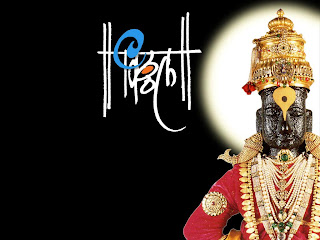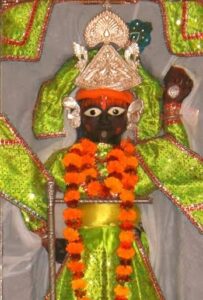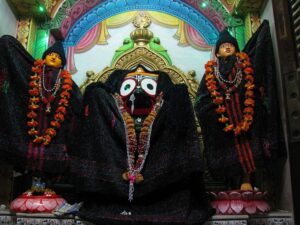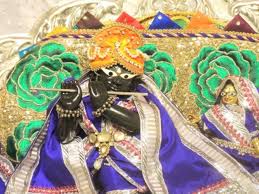Pandharpur and the Chandrabhaga River
Pandharpur, an important pilgrimage city in Maharashtra, is located on the banks of the Bhimā river, also known as the Chandrabhāgā due to its crescent moon shape. It is one of the most revered pilgrimage sites in Maharashtra, attracting millions of devotees every year. The city is named after Pandarika, a devout merchant who achieved self-realization there.
The Significance of Lord Vithoba
The name “Vithoba” holds deep meaning: “Vi” denotes knowledge, and “Thoba” refers to shape, making Vithoba the embodiment of knowledge. Another interpretation links the name to the Marathi word “Vit,” meaning brick, with “Ba” denoting father, symbolizing the fatherly figure who stands on a brick. Lord Vithoba is considered an incarnation of Lord Vishnu, Narayana, or Krishna, and is lovingly called Panduranga, Pandrinath, and Vithai by His devotees. His consort, Rakhumāi (Rukmini), is worshiped alongside Him in the temple.
The Legend of Pundalik
According to legend, Pundalik (Pandarika) was a devoted son to his parents, Janudev and Satyavati. However, after his marriage, Pundalik began to mistreat his parents. Fed up with his behavior, they decided to travel to Kashi (Varanasi) for salvation. Pundalik, along with his wife, joined them, but continued his treachery by making his elderly parents walk while he rode on horseback.
During their journey, they stopped at the hermitage of Sage Kukkutswami. One night, Pundalik witnessed a divine vision of beautiful women dressed in dirty clothes performing chores in the hermitage. They later revealed themselves as Ganga, Yamuna, and other holy rivers, who became tainted by the sins washed away by those who bathe in their waters. They chastised Pundalik for his sinful behavior towards his parents.
This realization transformed Pundalik, who began to serve his parents with utmost devotion. Pleased by his sincerity, Lord Vishnu left His abode in Vaikuntha to bless Pundalik. When Vishnu arrived at Pundalik’s home, Pundalik was busy serving his parents and could not attend to the Lord immediately. Instead, he offered the Lord a brick to stand on and requested Him to wait. Vishnu, pleased with Pundalik’s devotion, waited on the brick. When Pundalik finally approached, he asked Vishnu to remain on earth and bless all His devotees. Vishnu agreed, and from that moment, He became known as Vithoba, the Lord who stands on a brick, accompanied by His consort Rakhumai.
The Yatras to Pandharpur
Pandharpur hosts four major annual pilgrimages (yātrās) dedicated to Lord Vithoba, with the largest taking place in the month of Āshādh (June-July), attracting between 0.5 to 0.7 million devotees. Other significant pilgrimages occur in the months of Kārtik (October-November), Māgh (January-February), and Shrāvan (July-August).
The most famous of these is the Pandharpur Yatra, also known as the Pandharpur Wari or Ashadhi Ekadashi Wari, where devotees, known as Warkaris, undertake a pilgrimage on foot to Pandharpur. The main procession begins in Dehu, carrying the palkhi (palanquin) of Saint Tukaram, a revered devotee of Vithoba. Other processions, such as the Saint Dnyaneshwar palkhi from Alandi, join along the way, culminating in a massive gathering at the Vithal Rukmini Mandir.
Lessons to be Learned
- Devotion to Parents: The story of Pundalik teaches us the importance of serving our parents with devotion, as true service to them is seen as service to God.
- Humility and Gratitude: Pundalik’s transformation from arrogance to humility highlights the power of realization and the importance of being grateful for our blessings.
- God’s Compassion: Lord Vithoba’s willingness to wait for His devotee shows that God is compassionate and patient, always ready to bless those who are sincere in their devotion.
- Collective Devotion: The Pandharpur Yatra reflects the power of collective devotion and the unity of devotees in seeking the Lord’s blessings.
Prayer to Lord Vithoba
O Lord Vithoba, standing patiently on Your brick,
You who are the embodiment of divine knowledge and compassion,
Grant me the wisdom to serve my parents and elders with love,
And the humility to recognize the divine in all my duties.
May I always remember that true devotion lies in sincere service,
And may my heart be filled with the joy of Your presence.
Guide my steps as I journey through life,
Just as You guide the Warkaris on their sacred pilgrimage to Pandharpur.
O Vithoba, Panduranga, the ever-compassionate Lord,
May Your blessings be upon all who seek You,
And may we all find refuge in Your eternal love.
Quote from Shastra
“mātṛ-devo bhava, pitṛ-devo bhava, ācārya-devo bhava, atithi-devo bhava”
Translation:
“Let your mother be God, your father be God, your teacher be God, and your guest be God.”
— Taittiriya Upanishad 1.11.2
This verse underscores the importance of reverence towards parents, teachers, and guests, aligning with the lessons from the story of Pundalik and the devotion to Lord Vithoba.



